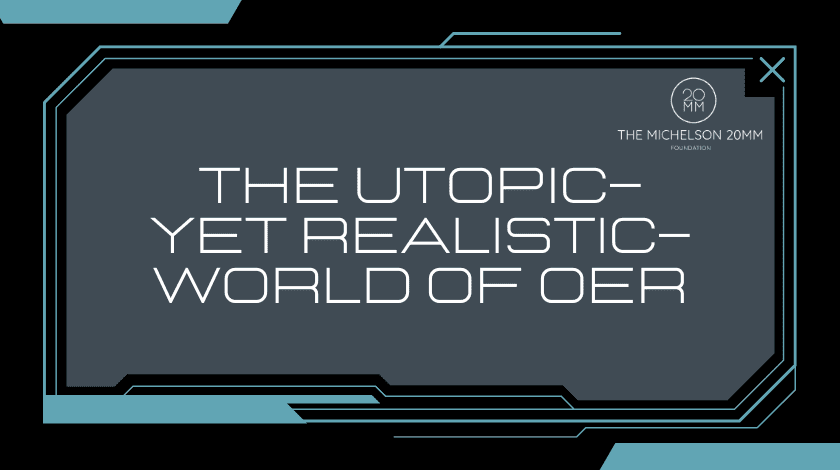News and Announcements
Live Long and Prosper in the Utopic–Yet Realistic–World of Open Educational Resources
Published Date
- October 14, 2022

By Cailyn Nagle
Growing up, Star Trek was always on. My Mom is a Trekkie, which means I am too. It feels like I inherited a love for the series in the same way that I inherited eye color or curly hair. Gene Rodenberry dreamed of a future that included androids and aliens existing peacefully (mostly) alongside humans, many of whom had diverse backgrounds themselves. The show impacted the shape of our real world technology, with inventors drawing inspiration from the “tricorder” to create the cellphones in our pockets. If I were to paint a picture of a human future among the stars, most would shrug and say “yeah sure, why not” but here’s where I get accused of utopianism.
Captain Picard was a decorated leader and a celebrated hobby archaeologist. The second in command of the Enterprise teaching himself to play trombone was a minor plot point throughout the show. Half of the crew seemed involved in community theater–for better or worse. The idea that adults are given the time, freedom, and access to continue to develop and explore their whole personhood shouldn’t be science fiction, yet for many this is more idealistic than traveling at the speed of light.
I have always organized around practicalities while identifying with ideals. In the field of open educational resources, that means I spend most of my time trying to create a world where textbooks aren’t a racket and students receive the materials they need. It is practical and correct to center the most marginalized and impacted in policy and programmatic work, but it is not enough to dream of a world where everyone has what they need to survive when everyone has the right to thrive.
Open pedagogy has been described by the Open Pedagogy Notebook as “an access-oriented commitment to learner-driven education AND as a process of designing architectures and using tools for learning that enable students to shape the public knowledge commons of which they are a part.” Open pedagogy usually incorporates open educational resources while challenging the ideas of “learner” and “teacher,” “knowledge creator” and “knowledge consumer.” As these ideas take root and those roots spread, I hope those roots start to form cracks in the walls of academia itself opening the way for knowledge seekers everywhere to slip in.
Education is not something confined to the first 24 years of our lives. It is not a stamp on our forehead before being pushed out the door and into the workforce. Education must be a constant and enriching pursuit helping each of us become whole while also becoming connected members of our communities. Open education has the potential to help form this reality.
Open educational resources are not only accessible to currently enrolled students; they are accessible to anyone who has the desire to learn. Whether their curiosity takes them to languages, history, or beekeeping, open materials are available for lifelong learners. Projects, such as MIT Open Courseware, provide lectures and more structured classes available to anyone with an internet connection. At the same time, publishers, such as Punctum Books out of Santa Barbara, are providing fuel for those who want to go deeper.
My passion for open education grows out of a dream where no one has to stop learning because of economic or practical reasons. Open education has the potential to democratize education, breaking the gifts of knowledge out of the classroom and into our lives. Is this impossibly utopianist? Maybe. But to quote Captain Picard, “Things are only impossible until they’re not.”
Michelson 20MM is a private, nonprofit foundation seeking to accelerate progress towards a more just world through grantmaking, operating programs, and impact investing. Co-chaired and funded by Alya and Gary Michelson, Michelson 20MM is part of the Michelson Philanthropies network of foundations.
To sign up for our newsletter, click here.